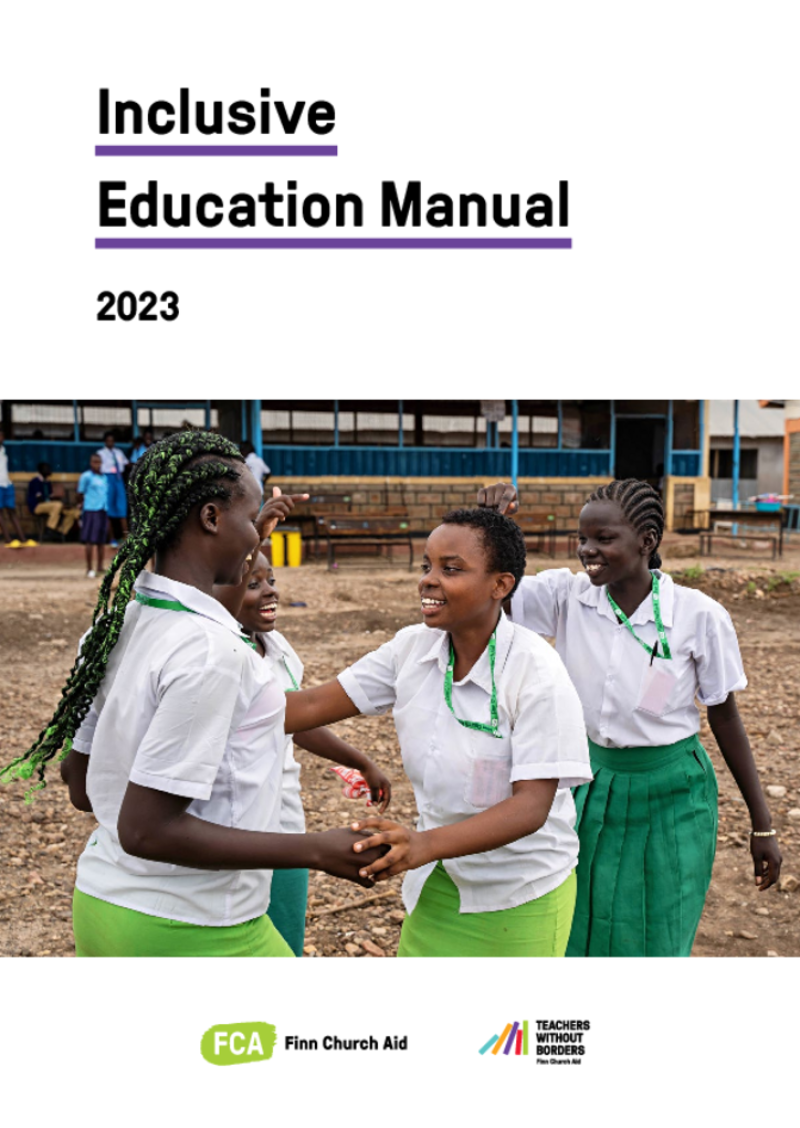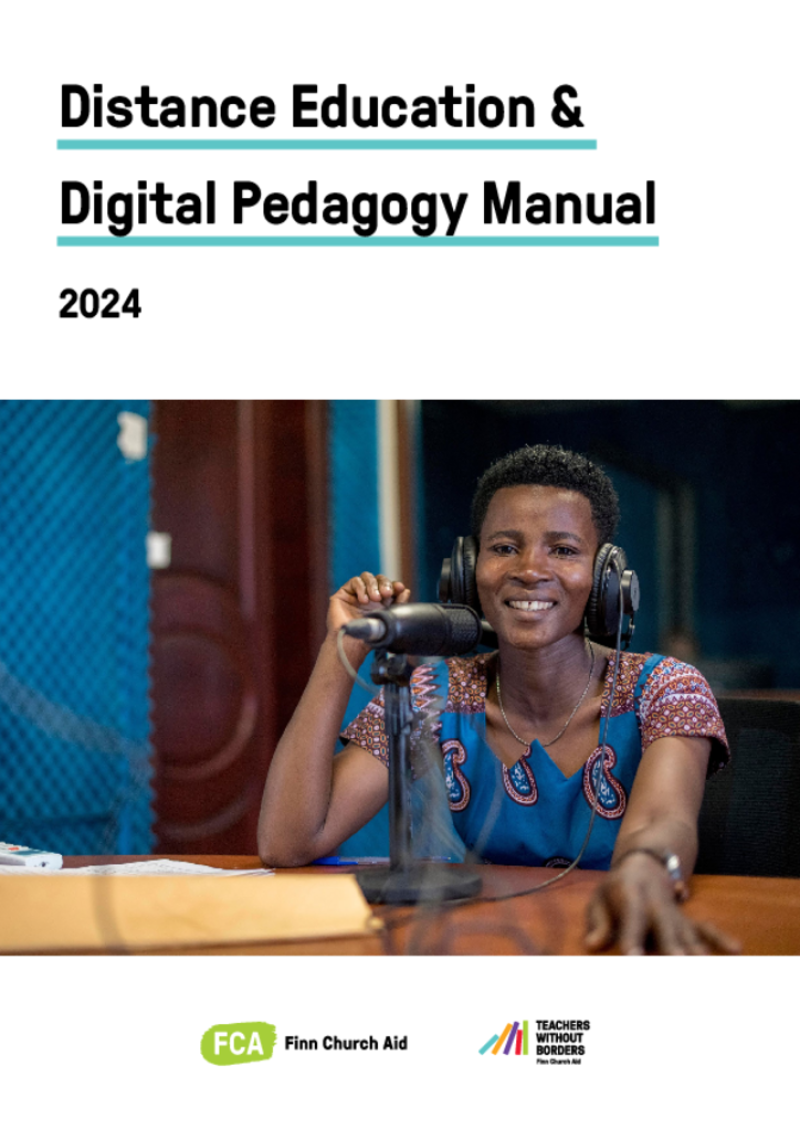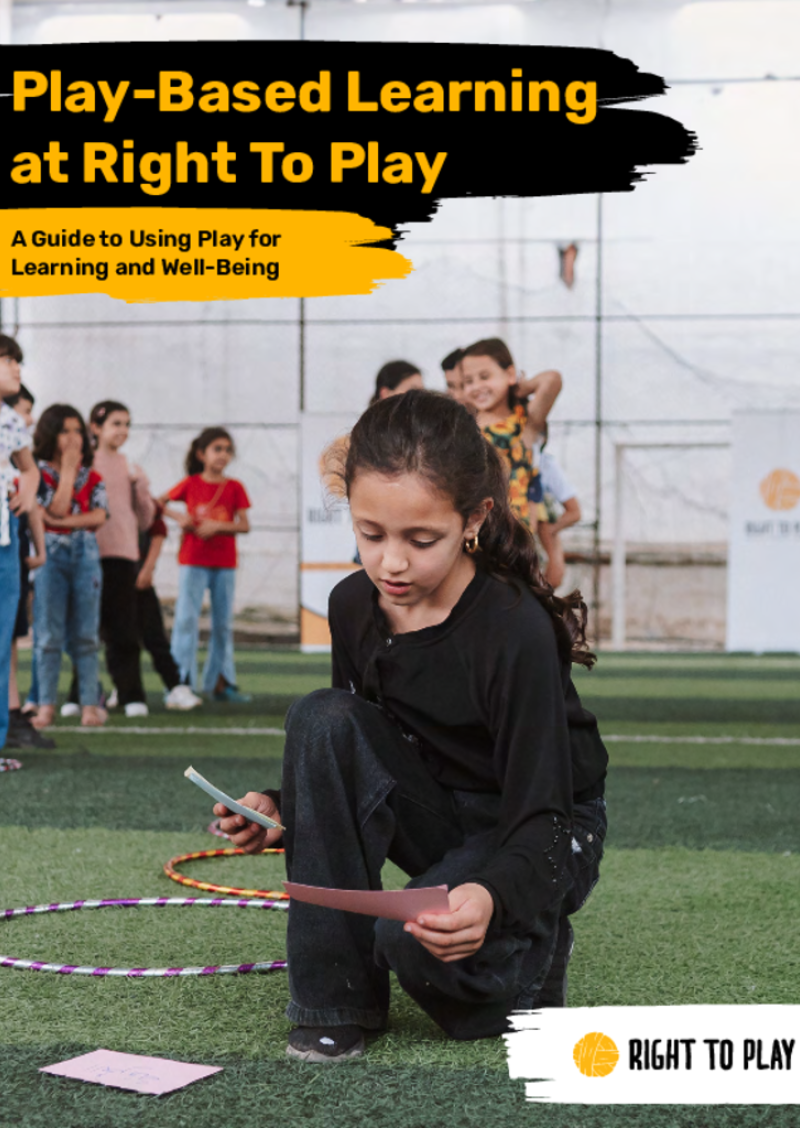Teacher Resource Centre
Displaying 1 - 20 of 113
FCA & TWB Inclusive Education Manual
This Teacher Training Manual on Inclusive Education supports teachers and other education personnel’s continuous professional development in inclusive, quality education especially in diverse low resource contexts and is adaptable for use anywhere in the world. The Inclusive Education Manual directly contributes to realization of several targets of the Agenda 2030 Sustainable Development Goal (SDG) 4 “ensuring inclusive and equitable quality education for all”.
The manual was developed by Finn Church Aid (FCA) and Teachers Without Borders (TWB) Network Finland. The content has been collected and built on the numerous good materials and practices used and co-developed by FCA staff and TWB education experts in different countries and contexts.
The training manual consists of three (3) training modules that can be used flexibly:
- Education, Teacher and School Community,
- Inclusive Education, and
- Positive Classroom and Learning Environment for All Learners.
The content design allows the trainer or facilitator to pick individual modules or sessions and adapt the training content according to the context and target group’s needs.
We hope you find it useful!
FCA & TWB Distance Education & Digital Pedagogy Manual
This teacher training manual on Distance Education & Digital Pedagogy supports teachers and other education personnel’s continuous professional development in pedagogically high-quality distance education and remote learning especially in diverse, low resource contexts and is adaptable for use anywhere in the world.
The manual has been developed by Finn Church Aid (FCA) and Teachers Without Borders (TWB) Finland. The development of the training materials began already in 2020 as a response to the school lock-down situations caused by the COVID-19 pandemic, when teachers and learners quickly had to adapt to remote education modalities. Even though the pandemic has subsided, the need for quality distance education prevails. Ensuring the continuity of learning for all learners is critical in all contexts, even and especially during crisis situations.
The training manual consists of eight (8) training modules that can be used flexibly:
- Distance Education,
- Distance Education Modalities,
- Pedagogy of Digital and Distance Education,
- Psychosocial and Emotional Wellbeing,
- Learner-Centred Methods in Distance Education,
- Home Support – Parents and Caregivers’ Role and Collaboration,
- Inclusive Education, and
- Assessment and Evaluation.
The content design allows the trainer or facilitator to pick individual modules or sessions and adapt the training content according to the context and target group’s needs.
We hope you find it useful!
Differentiated Instruction in Displacement Contexts. Workshops Facilitation Guide
In this guide, there are prompts to support exploration of the content and application to the local context. There are also tips to support educators as they make space and time for professional learning within their busy and, often, stressful lives. Finally, this guide offers some advice regarding online, and/or other technological aspects, of this training.
The Quality Holistic Learning Project (QHL), of which this face-to-face workshop is one element, aims to prepare educators to deliver high-quality lessons which support holistic learning for children and youths of diverse backgrounds (refugee, migrant, and/or citizen) within host country, displacement, and crisis contexts. They define quality holistic learning as that which attends to:
- academic, cognitive, and identity development,
- social and emotional learning, and
- mental/psychosocial and physical well-being and which delivers: positive schooling experiences, ● feelings of belonging and safety, growth and development, and equitable outcomes for all learners.
Introduction to Asset Based Pedagogies in Displacement Contexts Workshops Facilitation Guide
This manual is intended to support the delivery of one full day workshop on the topic of supporting Quality Holistic Learning in crisis contexts through the implementation of asset-based pedagogical tools and activities and through sustaining safe and secure learning spaces. The workshops are the result of the insightful contributions of a committed team of teachers and educators from Kenya, Lebanon, and Niger.
The Quality Holistic Learning Project (QHL), of which this face-to-face workshop is one element, aims to prepare educators to deliver high-quality lessons which support holistic learning for children and youths of diverse backgrounds (refugee, migrant, and/or citizen) within host country, displacement, and crisis contexts. We define quality holistic learning as that which attends to:
- academic, cognitive, and identity development,
- social and emotional learning, and
- mental/psychosocial and physical well-being and which delivers: positive schooling experiences, feelings of belonging and safety, growth and development, and equitable outcomes for all learners.
Integrating SEL & PSS into Lessons for Quality Holistic Learning
This open, self-paced course, Integrating SEL & PSS into Lessons for Quality Holistic Learning, was designed with a team of teachers working with refugee and vulnerable learners across Lebanon. It is intended to build upon previous learning related to social and emotional learning (SEL) and psychosocial support (PSS) to provide teachers with the confidence to critically evaluate activities, adapt them to their local context, and assess impact on student learning and well-being.
Educators who complete this online course will be able to:
- Define the concepts PSS and SEL.
- Integrate PSS and SEL in lesson plans.
- Create safe spaces for displaced learners, refugees, and other vulnerable students.
- Reflect on tools and teaching pedagogies when implementing PSS and SEL activities.
- Evaluate their adaptation and implementation of PSS and SEL activities.
It will take 8-10 hours, on average, to complete this course. It is entirely self-paced. There is a micro-credential opportunity shared at the end of the course for those interested in demonstrating their competency and earning a digital micro-credential and badge.
Asset (Strength) Based Pedagogies for Quality Holistic Learning
This open, self-paced course, Asset (Strength) Based Pedagogies for Quality Holistic Learning, was designed by teachers for teachers, especially those working with refugee and vulnerable learners around the world. It is intended to provide an overview of key terminology, concepts, and practices related to asset (or strength) based pedagogies.
Educators who complete this short online course will:
- gain a working understanding of what asset-based pedagogies are and why they are important
- be able to identify ways in which asset-based pedagogies can be applied in the classroom
- examine how to apply asset-based pedagogies in the context of their own work
It will take 3-4 hours, on average, to complete this course. A certificate of participation will be issued upon successful completion. Thank you for your interest and for your commitment to your professional learning and to teaching!
A handbook for use offline is currently being developed, as a parallel tool for learning about asset-based pedagogies. Please contact jkasper@ceinternational1892.org to discuss piloting of this additional material.
Introduction to SEL & PSS for Quality Holistic Learning
This open, self-paced course, Introduction to Social-Emotional Learning & Psychosocial Support for Quality Holistic Learning, was designed with a team of teachers working with refugee and vulnerable learners in Niger. It is intended to provide an overview of key terminology, concepts, and practices related to social-emotional learning and psychosocial support.
Educators who complete this online course will:
- understand the importance of creating a safe and inclusive environment for children's well-being and learning in emergency situations
- understand the basic principles of Psychosocial Support (PSS) and Social-Emotional Learning (SEL) and their role in supporting students in displaced contexts, especially considering the educator's unique students and learning context
- integrate simple and applicable PSS interventions and SEL activities into their lesson plans to ensure Quality Holistic Learning
It will take 4-5 hours, on average, to complete this course. A certificate of participation will be issued upon successful completion. Thank you for your interest and for your commitment to your professional learning and to teaching!
An offline, PowerPoint guided workshop series, upon which this course is based, is available for training purposes as well. Please contact jkasper@ceinternational1892.org to discuss piloting of that workshop material.
Educajeux - Manuel de pédagogie vidéoludique
Ce manuel explore le jeu vidéo comme outil d’apprentissage interdisciplinaire et support culturel à décrypter. Destiné aux enseignants et éducateurs, il propose des ateliers variés et des fondements pédagogiques pour intégrer le jeu vidéo dans les pratiques éducatives. En favorisant l’apprentissage par l’essai-erreur et le « learning by doing », cette ressource encourage à utiliser le jeu pour illustrer des notions abstraites et renforcer l’engagement des élèves. Elle offre aussi des essais contextualisant ce type d’apprentissage, invitant les enseignants à reconsidérer ce média et à l’utiliser comme levier pédagogique innovant.
Unlocking Potential: How Generative AI Can Help Enhance Career Readiness
Generative AI has the potential to make career education more accessible and impactful by offering personalized guidance and automating routine tasks. By leveraging AI, educators can design more efficient, tailored learning experiences, ensuring that every student—regardless of background—has access to the knowledge, tools, and opportunities they need to prepare for future success.
Join us on October 29th at 2:00pm GMT, as Sumit shares insights from his action research on how Generative AI can enhance career readiness for students from underserved communities, highlighting how one can leverage technology like GenAI to bridge educational gaps and equip students with the skills needed to thrive in future careers.
Register here
A Guide to Using Play for Learning and Well-Being
Right To Play uses a variety of approaches to play to support children’s learning, development, and well-being, including sports, music, theatre, art, and play-based learning.
This document focuses on the play-based learning methodology and approach, and how it can be used for learning and development goals related to Right To Play’s core programmatic areas: early childhood care and education, primary education, gender equality and girls’ well-being, and psycho-social support.
Play & resilience: a toolkit for teachers, caregivers, and other stakeholders
Play is an easy, natural and universal practice that builds resilience. Play comes naturally to all children- and is a seemingly simple and light-hearted phenomenon. The power of play as a pathway to building resilience needs to be leveraged to provide children with the opportunity to further explore play in their home and school environments.
This toolkit is therefore premised on the objectives to build the capacity of various stakeholders such as caregivers/teachers, school managers, curriculum planners and policy makers who are key actors in the process of growth and development of children. It is also aimed at equipping these stakeholders with the knowledge and pedagogical skills to translate research, policy and curriculum to practical knowledge and activities for children in the school environment. The toolkit offers directions for facilitators who will be working with caregivers/teachers using the materials and resources provided and other relevant materials available in an environment where it will be used.






